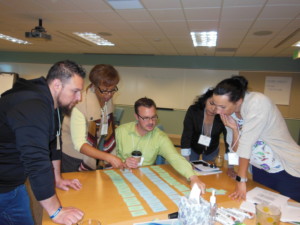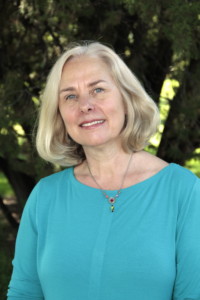By Barbara E. Lewis for EDRBlog.org
 Now more than ever, those of us who practice community engagement are acutely aware of how polarized ”the publics” have become. More and more, people connect with others who are like them, gather information from sources that confirm their values, and participate by checking a box or posting a statement. How can we help people move from isolation to productive conversation/ dialogue? How can we embrace conflicting views and open ourselves to new ways of seeing?
Now more than ever, those of us who practice community engagement are acutely aware of how polarized ”the publics” have become. More and more, people connect with others who are like them, gather information from sources that confirm their values, and participate by checking a box or posting a statement. How can we help people move from isolation to productive conversation/ dialogue? How can we embrace conflicting views and open ourselves to new ways of seeing?
While my degrees are in Environmental Economics and Water Resources Management, I entered the field of community engagement because I believed in people’s right to influence the decisions that affect their lives. My passion led me to Appreciative Inquiry, a strength-based process for creating the future by building on what’s working today. The cornerstone of Appreciative Inquiry (AI) is a paired interview among “improbable pairs”: people who don’t know or are different from one another. Appreciative questions enable people to share stories of success. They evoke images of ideal outcomes and invite reflection on how to get there. Time and again, people return from appreciative interviews surprised by the common ground they have discovered. AI connects people faster and more authentically than any other process I have used in my 35-year career, I believe for five reasons:
- Appreciative Inquiry focuses on what we want…
AI suggests that human systems – organizations, communities, countries – move in the direction of what they study. When we ask questions about problems, we get more problems; when we ask questions about hopes and possibilities, we discover opportunities. This doesn’t mean that problems or conflicts are ignored. Instead, it means that we work together to define what we want, not what we don’t want.
Get notified when new articles are posted to the EDR blog – sign up for our email list »
The City and County of Denver’s FasTracks team used AI to transform conflict into collaborative excellence. The groups responsible for planning and building this highly ambitious, politically charged, project were struggling with how to partner productively. Having recalled stories of effective partnerships and shared hopes for the project, they forged a common vision for project success. In the end, they collaboratively redesigned permitting processes and even a process for escalation. The Eagle P3 project, completed this year, now links downtown and suburban stations with Denver International Airport.
- Appreciative Inquiry deliberately seeks to surface all perspectives.
Recognizing that ”wholeness brings out the best,” AI invites people with diverse perspectives to co-design what will be asked, how, and of whom.
The Denver Museum of Nature & Science (DMNS) is using AI to become the community-responsive institution to which it has aspired. DMNS is partnering with community volunteers to engage Latino families, teens, and others whose voices are not often heard to co-create its future vision. Through 1-to-1 interviews and brief “community conversations,” participants are exploring questions such as:
- When have you felt a sense of wonder about the natural world? Tell me the story.
- When have you experienced a sense of excitement or felt wonder about science? Tell me the story.
- Imagine a new and different experience: an ideal space where you feel welcome to learn about nature and science … Where are you? What does it look and feel like? Specifically, what makes you want to spend time there?
- Appreciative Inquiry processes are positive, fun and meaningful.
AI invites people to share stories and listen generously. Everyone has a story to share and most of us love to share our stories. Sharing stories, hopes and dreams is uplifting, and reminds people of that which they most value.
- Appreciative Inquiry invites participants to ”make meaning” together.
After hearing one another’s stories, participants make meaning of what they have heard together, rather than delegating the task of analysis to third party “experts.” This distinctly different approach forges shared understanding and ownership of the findings.
- Appreciative Inquiry invites people to co-create the future.
AI processes enable people to dream and design the future: to forge a shared vision, then organize to make it happen. By beginning with clear articulation of strengths, AI builds community members’ confidence in their capacity to create something new.
The City of Longmont, Colorado’s citywide strategic planning process, Focus on Longmont, produced a shared vision for a sustainable community. The Longmont Times-Call described one of the initiative’s key events:
Democracy is not a spectator’s sport
In a party-like atmosphere, over 150 Longmont residents gathered Saturday to learn about each other and discuss ideas for the future of their City…. What was truly unique was bringing together senior and junior citizens, past and present City Councilors, city staff, civic activists, City advisory board volunteers, and members of Longmont’s power structure. An inspiring camaraderie developed by 5 PM adjournment which bodes well for the future of Longmont. Citizens agree far more than they disagree in what they want for Longmont.
As we continue working to bridge the differences that polarize us, imagine sitting down with someone from a different background, organization, or geographic area to ask a simple provocative question:
Every relationship changes us – but some relationships change us for the better. When have you experienced a relationship or friendship that’s changed you for good, with a person whose history or life experience is significantly different than your own?
Imagine listening generously and then answering this question yourself. Or, better yet, give it a try.
 Barbara E. Lewis is a Principal with the Rocky Mountain Center for Positive Change, which specializes in high engagement, strengths-based processes. She is also President of Catalyst Inc. and the Colorado Chapter of the International Association for Public Participation. With 30 years of experience in facilitating positive change, Barbara’s consulting and speaking engagements have focused on advancing the power of collaboration in government, schools, non-profits, faith-based organizations and communities. She is widely respected for her skills in designing and facilitating creative, objectives-driven processes involving diverse stakeholders. She is facilitating the Denver Museum of Nature & Science project as part of a Kebaya Consulting & Coaching team. She was the lead editor for The Promise of Appreciative Cities: Compelling the Whole to Act, the November 2013 edition of the AI Practitioner, and author of Positive Governing: Building upon your Best in the June 2014 edition of Colorado Municipalities. Barbara will be presenting on how Longmont has used Appreciative Inquiry at the Global Conference on Positive Change in Amsterdam in April 2017. Barbara is also a skilled trainer, with expertise in Appreciative Leadership, Appreciative Inquiry and community engagement. She has a B.A. in Economics from Colorado College and a M.S. in Water Resources Management from the University of Wisconsin. You can contact her at barbara@positivechange.org.
Barbara E. Lewis is a Principal with the Rocky Mountain Center for Positive Change, which specializes in high engagement, strengths-based processes. She is also President of Catalyst Inc. and the Colorado Chapter of the International Association for Public Participation. With 30 years of experience in facilitating positive change, Barbara’s consulting and speaking engagements have focused on advancing the power of collaboration in government, schools, non-profits, faith-based organizations and communities. She is widely respected for her skills in designing and facilitating creative, objectives-driven processes involving diverse stakeholders. She is facilitating the Denver Museum of Nature & Science project as part of a Kebaya Consulting & Coaching team. She was the lead editor for The Promise of Appreciative Cities: Compelling the Whole to Act, the November 2013 edition of the AI Practitioner, and author of Positive Governing: Building upon your Best in the June 2014 edition of Colorado Municipalities. Barbara will be presenting on how Longmont has used Appreciative Inquiry at the Global Conference on Positive Change in Amsterdam in April 2017. Barbara is also a skilled trainer, with expertise in Appreciative Leadership, Appreciative Inquiry and community engagement. She has a B.A. in Economics from Colorado College and a M.S. in Water Resources Management from the University of Wisconsin. You can contact her at barbara@positivechange.org.
